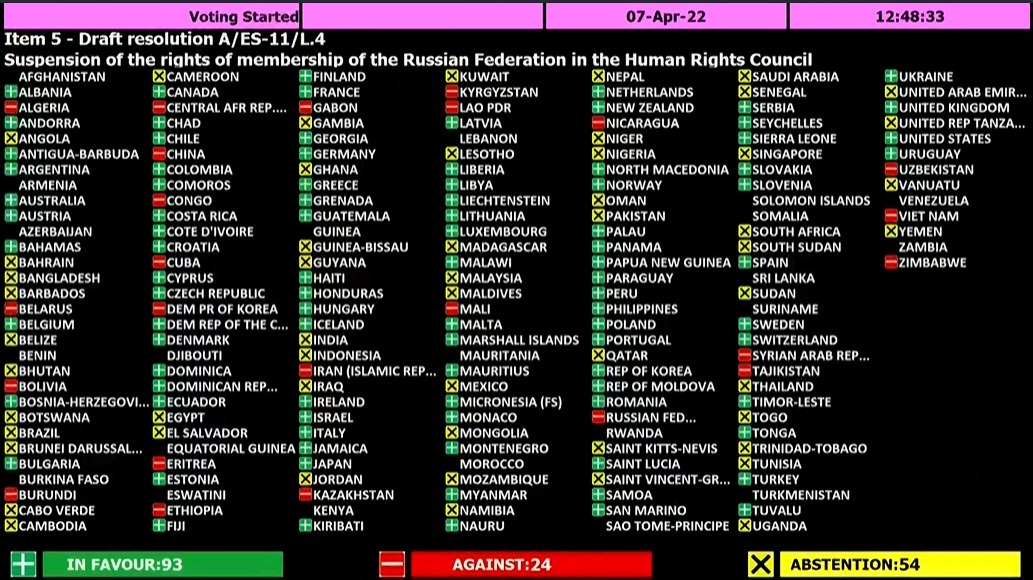By Nosmot Gbadamosi
When the United Nations voted last Thursday to suspend Russia from the Human Rights Council, African countries largely abstained. Washington has attempted to put diplomatic pressure on African governments to back sanctions against Moscow’s brutal invasion of Ukraine—a message increasingly ignored on the continent.
For South Africa, a BRICS member, it was the third abstention on Russia’s actions, a stance that analysts attributed to Russian President Vladimir Putin’s courtship of African leaders. During a call with South African President Cyril Ramaphosa on Friday, U.S. President Joe Biden “emphasized the need for a clear, unified international response to Russian aggression in Ukraine.”
While the African Union has clearly condemned Russian aggression, the lack of an overall consensus from African leaders has hampered Washington’s diplomatic offensive.
Senegal is a staunch Western ally, and its refusal cannot be attributed to Russian influence. Instead of backing a U.S. position, Senegalese President Macky Sall reiterated “the need to favor dialogue for a negotiated outcome to the conflict” during a call on Monday with Ukrainian President Volodymyr Zelensky, who has asked to address the AU. Sall’s position follows the continent’s principle of nonalignment, dating back to the 1960s, when newly independent African states sought a rejection of Western hegemony.
U.S. Ambassador to the U.N. Linda Thomas-Greenfield said last month in a BBC interview that “you cannot stand on the sidelines and watch the aggression that we see taking place in Ukraine and say you’re going to be neutral about it.” Samuel Ramani, an occasional contributor to Foreign Policy, commented that “Russia’s war with Ukraine will kill more Africans from starvation than Ukrainians on the battlefields. Africa should get off the fence and condemn Russian aggression.”
The reaction and tone of the debate, analysts say, marks a turning point in how diplomats and foreign-policy observers continue to view Africa as homogenous, lacking the nuance of 54 sovereign nations each acting on the basis of complex diplomatic and economic interests.
“African leaders have increasingly become more allergic to that tone—something that China has figured out,” said Kholood Khair, a Sudanese political analyst and managing partner at Insight Strategy Partners. “And it seems that the messaging coming from China gains more traction. It is more attractive to African countries that are trying to assert their own political strength.”
China’s stance on Russia has greatly influenced the positions of those African countries for which China is the biggest and closest trading partner. For some countries, abstention may not necessarily translate to a pro-Russia stance but a China-aligned stance.
African observers defending abstentions also point to the disproportionate media attention lavished on Ukraine compared with other conflicts and the double standards of the Western invasions of Libya and Iraq. There is also talk of “hypocrisy” in levying sanctions that impact African countries, while Europe has spent 35 billion euros ($38 billion) on Russian energy since the war began.
Some African leaders weighing up their countries’ vulnerability to volatile economic markets, growing and increasingly frustrated young populations, and facing their own security challenges requiring a range of allies have simply concluded that their governments cannot afford to take sides. The abrupt U.S. exit from Afghanistan and the horrific scenes of people clinging onto airplanes made some African policymakers view Washington as an unreliable partner that will also put its security needs first.
In 2021, when the United States paused an arms deal with Nigeria over concerns about human rights violations, Abuja turned to Russia, the largest exporter of arms to Africa, to replenish its arsenal for the fight against Boko Haram. Russia has often strengthened ties with African governments during tensions with the West. In Time, Sandun Munasinghe of the Tony Blair Institute for Global Change noted that “Africa has, for some time, been a second front in Putin’s confrontation with the West.”
Mali and the Central African Republic, key security benefactors, voted against Russian sanctions. Animosity over civilian killings during France’s Operation Barkhane, and the refusal of Paris to acknowledge responsibility, laid the groundwork for a Russian expansion into Mali. In turn, Moscow on Saturday blocked a request by France for a U.N. investigation into claims of a civilian massacre in Mali by Wagner mercenaries.
In CAR, Wagner paramilitaries secure the state government against armed rebels. But the government has also accused Russian mercenaries of 103 separate incidents of human rights abuses. In Sudan and the Horn of Africa, the United Arab Emirates filled the vacuum of U.S. leadership vacated under the Trump administration and continues to wield influence that often runs counter to Western interests.
The treatment of African students fleeing the war in Ukraine has also complicated African views. An editorial in the Guardian Nigeria suggests: “Following the lead of the African governments, the world is happy to tolerate the dehumanization of the Africans caught up in the war in Ukraine.”
There are others who note the quick global action against Russia while calls to remove African human rights violators from the Human Rights Council are ignored.
Cameroonians have long campaigned for sanctions against President Paul Biya’s administration over atrocities committed by Cameroonian soldiers (backed by U.S. support) in the fight against Boko Haram and Anglophone secessionists. Cameroon was reelected last year as a member of the Human Rights Council, which took effect in January. “If we are going to take measures to sanction dictators, then let us do it—but let’s do it for everybody,” said Cameroonian politician Kah Walla.
As African leaders find themselves at odds with Western nations, and the war risks diverting U.S. support and endangering commitments toward peace, security, and economic recovery recently announced at the AU-European Union summit, there is little appetite on the continent for navigating between Cold War rivals. And perceived patronizing and neocolonial discourse used to condemn African countries’ nonalignment only pushes countries closer to China and the Gulf and benefits authoritarian leaders who use those arguments to stay in power.
Credit | Africa Brief of Foreign Policy, 12 April 2022

